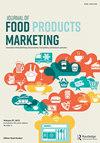Keep Forgetting to Make a Shopping List? Don’t Beat Yourself up over It!
IF 3.6
Q2 BUSINESS
引用次数: 1
Abstract
ABSTRACT This study aims to determine the impact of shopping lists on consumer spending and healthy shopping behaviors. A non-hypothetical field experiment was conducted, using the online platform Amazon Mechanical Turks, to determine the value 228 consumers place on these self commitment devices via their willingness-to-accept (to give up their list) or equivalent gain (to write a list) for a shopping list during a grocery shopping trip. By randomly determining who kept and who gave up shopping lists, we are able to explore causal effects of lists on food spending and the healthiness of food purchases. We find that after controlling for conscientiousness, consumers willingness-to-accept to give up their shopping list is $5.05, while the equivalent gain to write a shopping list is $3.87. We did not however find a significant difference in the healthiness of the purchases made by consumers using a shopping list versus those without. There is a lack of prior research on this topic – particularly papers that use a random assignment to treatment. Previous studies have explored correlations between shopping list use and spending; however, this study provides a value of list use, utilizes a credible approach to determine impact of list use disentangled from unobserved confounds, and provides insights on impact of shopping lists on healthy eating.总是忘记列购物清单?不要因此而自责!
摘要本研究旨在探讨购物清单对消费者支出和健康购物行为的影响。利用在线平台亚马逊机械土耳其人(Amazon Mechanical Turks)进行了一项非假设的现场实验,以确定228名消费者在购物旅行中对购物清单的接受意愿(放弃清单)或等效收益(写清单),从而确定他们对这些自我承诺设备的价值。通过随机决定谁保留和放弃购物清单,我们能够探索清单对食品消费和食品购买健康的因果影响。我们发现,在控制责任心后,消费者愿意接受放弃购物清单的收益为5.05美元,而编写购物清单的收益为3.87美元。然而,我们没有发现使用购物清单的消费者与不使用购物清单的消费者在购物的健康程度上有显著差异。在此之前,缺乏对这一主题的研究,特别是使用随机分配治疗的论文。之前的研究已经探索了购物清单的使用和消费之间的关系;然而,本研究提供了清单使用的价值,利用一种可信的方法来确定清单使用的影响,从未观察到的混淆中解脱出来,并提供了购物清单对健康饮食影响的见解。
本文章由计算机程序翻译,如有差异,请以英文原文为准。
求助全文
约1分钟内获得全文
求助全文
来源期刊

Journal of Food Products Marketing
BUSINESS-
CiteScore
5.70
自引率
6.90%
发文量
17
期刊介绍:
From food promotion and advertising through new food product development and consumer behavior research, the Journal of Food Products Marketing provides timely, practical articles that keep food marketers on the cutting edge of their profession. The journal includes refereed research studies as well as opinions, guidelines, and speeches by practitioners that contribute to the better practice and understanding of food marketing. The journal provides a single forum for both food marketing academicians and food marketing practitioners.
 求助内容:
求助内容: 应助结果提醒方式:
应助结果提醒方式:


